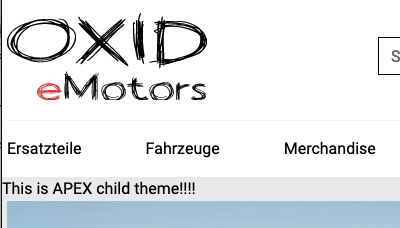Extend twig compatible theme with a child theme
It is possible to create a child theme for an existing (and installed) theme in OXID eShop. There’s only one level of inheritance possible, and depending on the use case, it’s possible to achieve the same inheritance results with a module.
We’ll show both cases in the following section.
Create a child theme
Create a Composer-installable child theme of APEX. To mark a theme as a child theme, add parentTheme and parentVersions into theme.php as in the following example:
$aTheme = [
'id' => 'apex_child',
'title' => 'APEX child',
'description' => 'APEX child is OXID`s demo child of APEX theme.',
'thumbnail' => 'theme.jpg',
'version' => '0.0.1',
'author' => '<a href="http://www.oxid-esales.com" title="OXID eSales AG">OXID eSales AG</a>',
'settings' => [],
'parentTheme' => 'apex',
'parentVersions' => ['1.1.0', '1.2.2'],
];
For a child theme, it’s not necessary to copy the entire parent theme. Only copy the templates you need to adapt, maintaining the same file structure as the parent theme.
|-- composer.json
|-- theme.php
`-- tpl
`-- page
`-- shop
`-- start.html.twig
The child theme’s start.html.twig template might, for example, get an additional block.
{% capture append = "oxidBlock_content" %}
{% block child_theme_block %}
<div>
This is APEX child theme!!!!
</div>
{% endblock %}
{% include_content 'oxstartslot1' ignore missing %}
...
The template engine renders the child theme’s start.html.twig file while using all other templates from the parent theme.

Extend a theme via module
All you can achieve with a child theme can also be done with a module. In all OXID eShop Version 7 installations, module settings fully reside in YAML configuration files, which are much easier to deploy than theme configurations that are still stored in the database (oxconfig table).
Note
With the twig extension mechanism you can only extend existing template blocks. Regarding the ‘I want to completely exchange a template by child theme’ case. That’s also possible via module, you need to add a module own template and chain extend the shop controller in question using the module’s template instead of the original theme template.
A module can extend templates for each theme, but we also have a ‘one size fits all’ approach by using the special directory name default.
To learn more about theme extensions for modules, check the following documentation: